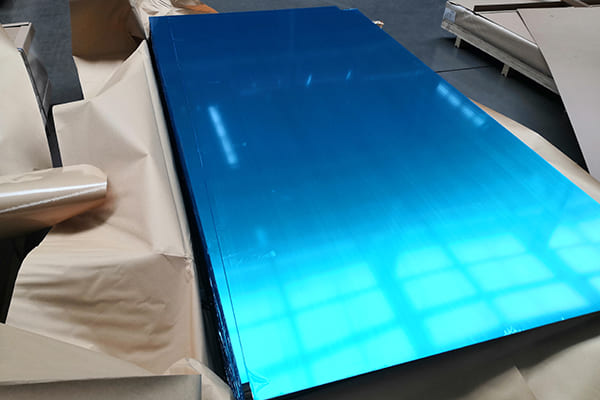The yield strength and elastic modulus of materials are the most basic parameters for calculating the strength of ship structures and determining the structural dimensions.
The yield strength and elastic modulus of materials are the most basic parameters for calculating the strength of ship structures and determining the structural dimensions. Since the elastic modulus and density of various aluminum alloys are roughly the same, and adding a small amount of alloying elements or changing the heat treatment state has little effect on them, increasing the yield strength within a certain range is beneficial to reducing the weight of ship structures. Generally, the density of aluminum alloys is about 2.7~2.8/cm3, and the elastic modulus is about 70~73GPa. However, it is usually difficult for high-strength aluminum alloys to have excellent corrosion resistance and weldability at the same time. Therefore, aluminum alloys for ships are generally selected from aluminum alloys with medium strength and corrosion resistance and weldability. In addition, cast aluminum alloys also have certain applications in the field of ships.

Material selection principles and advantages of aluminum alloys for ships
For ships, welding connection has obvious advantages over riveting connection. Therefore, welding connection method has been widely used in shipbuilding, basically replacing riveting structure. At present, automatic argon arc welding method is mainly used in aluminum ship construction. The good weldability of aluminum alloy means that the tendency of cracks formed during welding of aluminum alloy is small, that is, aluminum alloy has good welding crack resistance, and the performance of welded joints does not change much after welding. Because the performance lost due to welding cannot be restored by re-heat treatment under shipbuilding conditions, this is one of the important characteristics of marine aluminum alloys that is different from other structural aluminum alloys. The strength of AL-Zn-Mg and AL-Mg-Si alloys is significantly reduced after welding, and the corrosion resistance of AL-Zn-Mg alloys is also poor after welding. Therefore, these two alloys are subject to certain restrictions when used as welding ship materials. AL-Mg alloys do not have this disadvantage. AL-Zn-Mg alloys are mainly used for components that can be heat treated after welding (such as torpedo shells), and AL-Mg-Si alloys are mainly used as profiles.
Ship structures are mostly used in harsh seawater media and marine environments, so whether aluminum alloys are corrosion-resistant is one of the main indicators that determine whether they can be used as marine aluminum alloys. Generally, it is required that the marine aluminum alloy matrix and welded joints have no tendency to stress corrosion, exfoliation corrosion and intergranular corrosion in seawater and marine environments; contact corrosion, crevice corrosion and marine biological attachment corrosion should be avoided as much as possible; and small uniform corrosion and pitting corrosion are allowed.
During the construction process, ships must undergo cold processing (such as folding, curling, roll bending, stamping, etc.) and hot processing (such as hot bending, pyrotechnic correction, etc.). Therefore, marine aluminum alloys are required to be easy to process and form, without defects such as cracks during processing, and still meet the performance requirements of strength and corrosion resistance after processing.
Aluminum alloy has the characteristics of low specific gravity and elastic modulus, corrosion resistance, weldability, easy processing, non-magnetic and good low-temperature performance. It has the following advantages when used in ships:
More knowledge about marine aluminum plates: https://hw-alu.com/applications/aluminum-sheet-for-boat.html
Powder coated aluminum sheet refers to the aluminum sheet processed by powder spraying process;
Aluminium circle for cookwares typically refers to a circular-shaped piece or circle made from aluminum that is used in the manufacturing of various types of cookware, such as pots, pans, and cooking utensils.
Cigarette aluminum foil has properties such as moisture-proof, anti-oxidation, and heat insulation. It is mainly used to protect the quality of cigarettes and maintain the humidity of cigarettes.
6061 aluminum sheet is an al-si-mg alloy that has been strengthened by precipitation hardening. 6061 aluminum has a high strength-to-weight ratio, above-average corrosion resistance, good machinability, and is well suited for welding.
As a professional manufacturer and exporter of aluminum foil jumbo roll seals in China. We have been in this field for more than 20 years, we have a factory and dust-free workshop of more than 100,000 square meters
The market price of 1235 aluminum foil is relatively cheap, and it has become one of the most popular products on the market. It is a common household aluminum foil that can be used as food flexible packaging foil.
No.52, Dongming Road, Zhengzhou, Henan, China
Henan Huawei Aluminum Co., Ltd, One Of The Biggest Aluminum Supplier In China Henan,We Are Established In 2001,And We Have rich experience in import and export and high quality aluminum products
Mon – Sat, 8AM – 5PM
Sunday: Closed
© Copyright © 2023 Henan Huawei Aluminium Co., Ltd
Latest Comments
Dear Sir, Please offer your best FOB Prices specs are as under ALUMINIUM STRIP (AL=99.50% MIN) SIZE:450 X32 X6 MM. DIN EN 570 EN-AW 1050 A, QUANTITY=3400KG
Hello, Would you be so kind to offer item as follows: Coil 0,6х1250 (1000)mm EN AW-3105 5tons
Hello, Can you offer me Aluminium plates? Actally I need: 110mm x 1700mm x 1700mm 5083 H111 - 21 pcs Next year planed is 177 pcs
Świetny artykuł. Byłem zachwycony, że wyszukałem ten artykuł. Wielu osobom wydaje się, że mają rzetelną wiedzę na ten temat, ale często tak nie jest. Stąd też moje miłe zaskoczenie. Jestem pod wrażeniem. Zdecydowanie będę rekomendował to miejsce i częściej wpadał, aby zobaczyć nowe rzeczy.
requirement of aluminium strip